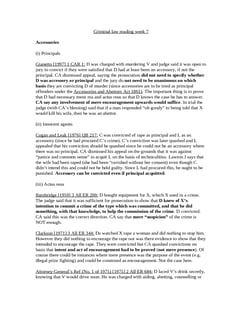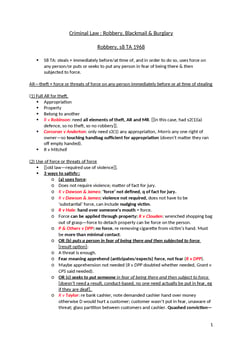R v Lloyd [1985] QB 829; [1985] 3 WLR 30; [1985] 2 All ER 661; [1985] Crim LR 518
Judgement for the case R v Lloyd
Table Of Contents
KEY POINTS
-
In crimes, conspiracy, and theft complex and multifaceted, processes often involve considerations of intent, agreement, and breach of various statutes.
In the context of a feature film, particularly the act of copying it in violation of copyright, the legal analysis becomes even more nuanced.
Conspiracy, in a criminal context, refers to an agreement between two or more individuals to commit an unlawful act.
The applicable legal framework in this scenario includes the Theft Act 1968 (c. 60), particularly sections 1(1) and 6(1), which delineate offenses related to theft and dishonesty. The Criminal Law Act 1977 (c. 45), section 1(1), is also relevant, as it addresses conspiracies to commit offenses.
-
The question arises as to whether the conduct, primarily the act of copying the feature film, could be indictable as a conspiracy to defraud.
This hinges on whether the actions are deemed fraudulent and if they constitute a conspiracy to dishonestly deceive or prejudice the rights of others.
The Theft Act 1968 and the Criminal Law Act 1977 provide the statutory framework for assessing the criminality of such actions, requiring a meticulous examination of intent, agreement, and the potential permanency of deprivation.
FACTS
-
Sidney Douglas Lloyd, Ranjeet Bhuee, and Mohammed Chaukal Ali ("Appellants") The cinema projectionist, covertly took feature films slated for screenings and lent them to Appellants B. and A., and another individual, M., who created pirated copies.
Films were swiftly returned to avoid detection.
The Appellants pleaded not guilty to common law conspiracy to defraud and were additionally charged with conspiracy to steal feature films under the Criminal Law Act 1977.
The jury, considering sections 1(1) and 6(1) of the Theft Act 1968, convicted them.
On appeal, the question was whether the offense of conspiracy to steal occurred when the individuals intended to return the film within hours but knew that numerous copies would be made, substantially reducing its value.
The Crown urged reactivation of the count of conspiracy to defraud.
JUDGEMENT
-
The appeal was allowed on three grounds:
First, the Appellants were not guilty of theft or conspiracy to steal as they intended to temporarily deprive, not permanently.
-
Second, the borrowing of films for copyright piracy did not meet the criteria for guilt under section 6(1) of the 1968 Act, as the films retained their value.
Consequently, convictions of conspiracy to steal were quashed.
Third, a conspiracy to defraud at common law could not be pursued since executing the conspiracy would breach the Copyright Act 1956.
The court advised referencing section 6 of the Theft Act 1968 exceptionally, and under section 6(1), the intention to permanently deprive is deemed to exist in cases where goods are taken with the intent to return only upon payment.
COMMENTARY
The case highlights the complexity of crimes involving conspiracy and theft, specifically in the context of unauthorized copying of feature films.
The case involves Sidney Douglas Lloyd, Ranjeet Bhuee, and Mohammed Chaukal Ali, who were charged with common law conspiracy to defraud and conspiracy to steal feature films.
-
The appeal succeeded on three grounds:
the intention was temporary, not permanent;
borrowing films for copyright piracy did not meet guilt criteria under the 1968 Act;
and pursuing a common law conspiracy to defraud would breach the Copyright Act 1956.
The court suggested an exceptional use of the Theft Act 1968's section 6 and noted that under section 6(1), intent to permanently deprive is deemed to exist when goods are taken to return only upon payment.
For Further Study on R v Lloyd

Criminal Law notes fully updated for recent exams at Oxford and Camb...
Need instant answers? Our AI exam tutor is here to help.
Ask questions 🙋 Get answers 📔 It's simple 👁️👄👁️
Our AI is educated by the highest scoring students across all subjects and schools. Join hundreds of your peers today.
Get StartedSimilar Cases
Related Product Samples
These product samples contain the same concepts we cover in this case.
| Criminal Law | Property Offences Notes (20 pages) |
| GDL Criminal Law | Theft Related Offences Notes (11 pages) |

